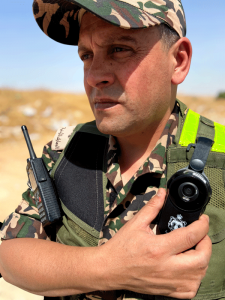Jordan Customs equips patrol officers with body-worn cameras
18 October 2023
By Eng. Mohammad B Alqaderi, Head of Electronic Command and Control Division, Jordan Customs DepartmentBody-worn cameras are small cameras which can be clipped onto clothes or worn as a headset and turned on to record video and audio. In some countries, enforcement agencies are using the devices to monitor officers on patrol or on other assignments that bring them into contact with individuals. This has also been the case with the Jordan Customs Department (JCD) since December 2019.
About the devices
The cameras record high-quality videos with time and date stamps and GPS coordinates. They are equipped with 4G SIM cards that stream videos directly to control rooms. They have the ability to automatically start recording when they sense certain triggers, but the Administration decided to let officers decide when to switch them on. The devices capture what happens 60 seconds before the record button is pressed. Footage is automatically uploaded to a database maintained by the JCD and is accessible only to authorized persons under strict rules. Additionally, a copy of the footage is uploaded when the cameras are inserted into the docking station. Officers do not have the ability to view, delete or edit the stored footage.
When in use, a camera must be attached to the officer’s uniform in an overt manner and be visible to the public. As soon as the camera starts to record, a flashing red light appears at the front of the camera and the Customs officer must inform individuals that they are being filmed.
Research
The Department conducted extensive research and practical experiments to determine the required specifications to be met by the cameras. The team in charge of the project first had to document the situations that the officers of the Anti-Smuggling Directorate and the Customs Escort Directorate were exposed to while performing their daily duties. These include, for the former, searching suspect vehicles, shops, factories and homes; for the latter, they include escorting transit trucks passing through Jordan. The team reviewed complaints and analysed the behavioural responses of each party during interactions, as described in claim files. They also studied the literature available on the topic.
Benefits and usage
Various benefits were identified regarding the proper use of the body-worn cameras:
- enhanced compliance with discipline and integrity rules;
- increased trust and confidence in law enforcement;
- increased civility and positive interactions between officers and citizens; and
- reduction in citizen complaints, and quicker resolution of complaints and lawsuits.
They were all confirmed during the experimental phase. The cameras enabled the JCD to reduce the number of incidents. Officers in the control room can provide instructions to Anti-Smuggling Directorate patrollers dealing with difficult situations, or even decide to send them support.

The JCD has issued rules on the use of BWCs, and a set of disciplinary measures when officers fail to wear or operate the cameras without reasonable grounds. The cameras also have a deterrent effect on individuals, who are now less inclined to trouble inspectors. There has also been a decrease in the number of incidents of verbal abuse, assaults, and factually unfounded complaints against the patrollers.
The cameras have also enabled the Administration to increase compliance with standard operation procedures, enhance the accuracy of seizure reports, and respond to allegations of damage or shortfalls of goods following an inspection. Videos of a search are reviewed before reports are finalized, and it is possible to assess whether the data related to the quantity and types of goods is correct, and whether some items have not been reported. The quality of the work has improved: patrollers make fewer errors, while the time required to conduct an inspection has decreased.
Footage captured may also be used as evidence in arrests or prosecutions. Civilians who allege public misconduct or who are accused of a crime can view the footage in which they appeared, before making their initial statements, by submitting a request to the judicial authorities.
It can also be used to assess and train officers. Cases are analysed to draw lessons and develop guidance for field officers. Such analyses could also support the review of policies and procedures in the future. The cameras were used when building the National Trade Window (NTW), enabling the officers in charge of the project to observe the inspection process at Aqaba and assess whether the agencies brought together under the NTW could use the footage to inspect goods, instead of requiring samples or items to be sent to their offices.
Customs escorting
The JCD uses an electronic seal system to track goods transported in transit, and mobile intervention teams when something suspicious is detected. Officers of the Customs Escort Directorate are in charge of checking the integrity of the seal at the point of departure and the point of arrival while trucks pass through Jordan. The cameras are activated during this process and record the seal number. Video recordings corresponding to the same number are automatically matched and anomalies identified, facilitating the work of the control room officers.
More information
customs@customs.gov.jo
